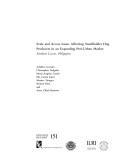| Listing 1 - 7 of 7 |
Sort by
|
Periodical
Abstract | Keywords | Export | Availability | Bookmark
 Loading...
Loading...Choose an application
- Reference Manager
- EndNote
- RefWorks (Direct export to RefWorks)
Periodical
Abstract | Keywords | Export | Availability | Bookmark
 Loading...
Loading...Choose an application
- Reference Manager
- EndNote
- RefWorks (Direct export to RefWorks)
Swine --- Swine breeders --- Pork industry and trade --- Pork industry and trade. --- Swine. --- Swine breeders.
Periodical
Abstract | Keywords | Export | Availability | Bookmark
 Loading...
Loading...Choose an application
- Reference Manager
- EndNote
- RefWorks (Direct export to RefWorks)
Swine --- Swine breeders --- Pork industry and trade --- Pork industry and trade. --- Swine. --- Swine breeders.


ISBN: 0896291596 Year: 2007 Publisher: Washington International food policy research institute
Abstract | Keywords | Export | Availability | Bookmark
 Loading...
Loading...Choose an application
- Reference Manager
- EndNote
- RefWorks (Direct export to RefWorks)
Agriculture and state --- Farms, Small --- Pork industry and trade --- Swine breeders
Book
ISBN: 9780300246292 0300246293 Year: 2020 Publisher: New Haven: Yale university press,
Abstract | Keywords | Export | Availability | Bookmark
 Loading...
Loading...Choose an application
- Reference Manager
- EndNote
- RefWorks (Direct export to RefWorks)
Swine --- Swine breeders --- History --- Swine breeders. --- Swine. --- To 1500. --- Europe. --- North Africa. --- Livestock breeders --- Domestic pig --- Hogs --- Pig --- Pig farming --- Pigs --- Sus domestica --- Sus domesticus --- Sus scrofa domestica --- Sus scrofa domesticus --- Livestock --- Sus
Book
ISBN: 1478012048 Year: 2020 Publisher: Durham : Duke University Press,
Abstract | Keywords | Export | Availability | Bookmark
 Loading...
Loading...Choose an application
- Reference Manager
- EndNote
- RefWorks (Direct export to RefWorks)
"Alex Blanchette explores how the daily lives of a Midwestern town that is home to a massive pork complex were reorganized around the life and death cycles of pigs while using the factory farm as a way to detail the state of contemporary American industrial capitalism."--
Swine industry --- Swine breeders --- Factory farms --- Agriculture --- Economic aspects --- agribusiness. --- capitalist vertical integration. --- factory farming. --- mechanization of slaughter industry.
Book
ISBN: 9781478007890 1478007893 9781478008408 1478008407 1478012048 Year: 2020 Publisher: Durham, N.C.: Duke university press,
Abstract | Keywords | Export | Availability | Bookmark
 Loading...
Loading...Choose an application
- Reference Manager
- EndNote
- RefWorks (Direct export to RefWorks)
"PORKOPOLIS is an ethnographic account of hog production in "Dixon," a 15,000-resident agribusiness town in the Great Plains. In Dixon, where nearly 5,600,000 hogs are killed a year, human life has been reorganized around the life and death cycles of porcine production. Alex Blanchette accounts for the totalizing force of hog production by arguing that towns like Dixon represent a reinvestment in 20th-century notions of industry in a post-industrial United States. In practice, this means not only the taking up of industrial stock images, organization forms, and identities, but also an intense desire, on the part of agribusiness corporations, to achieve standardization-to create the "perfect" pig. To achieve standardized results, agribusiness corporations have implemented systems of full "vertical integration," in which they directly own and engineer every stage of a pig's life and death cycle. The result, Blanchette argues, is more than just an effort to create the perfect pig, but rather a calibration of human life and affect to meet the needs of porcine production. Drawing on his ethnographic fieldwork as a worker in a hog factory, Blanchette illustrates how methods of vertical integration and standardization in agribusiness factories work to transform hogs-and humans-into tokens of capitalist animality. The book is divided into five parts. Part I, "Boar," examines how corporations manage the threat of porcine diseases, and the biopolitical protocols that corporations enact in workers' homes to protect hogs. Part II, "Sow," draws from Blanchette's own experiences working the artificial insemination line, where workers are encouraged to "become the boar" with their hands to imitate mating. This part theorizes interspecies and labor politics that arise from situations in which workers are only intimate with one dimension of pigs-in this case, porcine sexual instincts. Part III, "Hog," explores the consequences of standardizing animality, where genetic refinements create litters too large to supply adequate nutrients in uterus. Part IV, "Carcass," examines the vertical integration of human workers' bodies on the assembly lines. Part V, "Viscera" explores the biological "excess" of porcine production-bones, feces, fat, livers, lungs-and corporations' desires to use "all" of the pig. This section examines how the fully integrated factory farm depends on modes of consumption that extend beyond what can be supplied by human eaters alone. This book will be of interest to scholars of anthropology, animal studies, neoliberalism and globalization, capitalism and social theory." --
Swine industry --- Swine breeders --- Factory farms --- Agriculture --- Economic aspects --- Animal factories --- CAFOs (Farms) --- Concentrated animal feeding operations --- Confined animal feeding operations --- Factory farming --- Factory-sized livestock farms --- Farm factories --- Industrial livestock farms --- Livestock factories --- Mega-livestock farms --- Animal industry --- Livestock farms --- Meat industry and trade --- Livestock breeders --- Swine trade --- #SBIB:39A4 --- #SBIB:316.334.2A520 --- Toegepaste antropologie --- Organisatiesociologie: arbeidssituatie en arbeidsomstandigheden: algemeen --- Swine industry - United States --- Swine breeders - United States --- Factory farms - United States --- Agriculture - Economic aspects - United States --- agribusiness. --- capitalist vertical integration. --- factory farming. --- mechanization of slaughter industry.
| Listing 1 - 7 of 7 |
Sort by
|

 Search
Search Feedback
Feedback About UniCat
About UniCat  Help
Help News
News